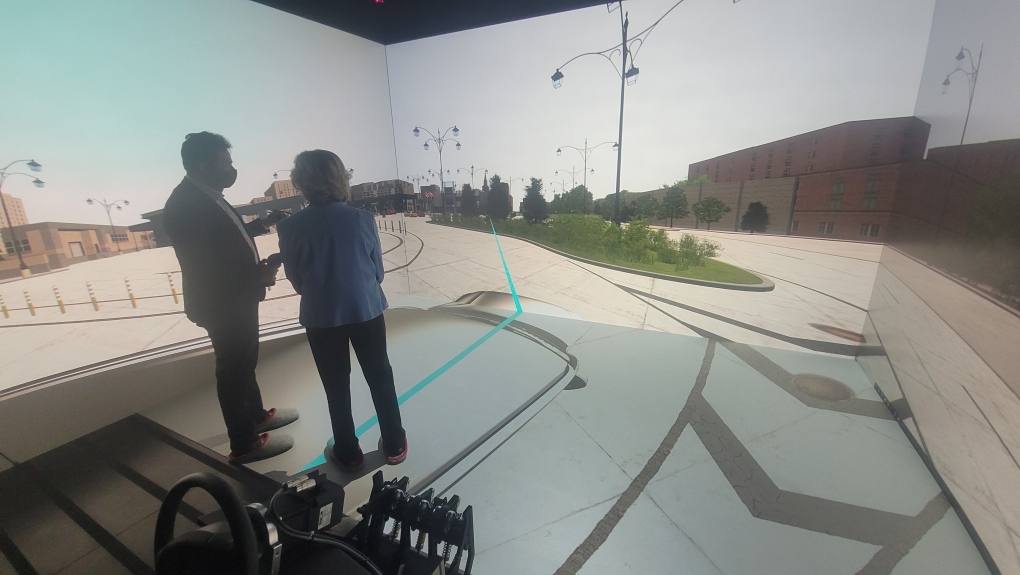Canada's first virtual cross-border test track unveiled in Windsor
 The newest test tracks for cross-border CAV technology and infrastructure simulation were unveiled in Windsor, Ont. on Thursday, April 21, 2002. (Sanjay Maru/CTV Windsor)
The newest test tracks for cross-border CAV technology and infrastructure simulation were unveiled in Windsor, Ont. on Thursday, April 21, 2002. (Sanjay Maru/CTV Windsor)
Invest WindsorEssex and government officials are unveiling the newest test tracks for cross-border CAV technology and infrastructure simulation in Windsor.
The economic development organization hosted Helena Jaczek, minister responsible for the Federal Economic Development Agency for Southern Ontario (FedDev Ontario) and Irek Kusmierczyk, MP for Windsor-Tecumseh, to experience Canada’s first virtual international border crossing for Connected and Automated Vehicle (CAV) testing.
FedDev Ontario, the City of Windsor and Windsor Detroit Borderlink Limited, IWE provided more details on the test tracks on Thursday.
“This cross-border test track will help local companies, government and post-secondary institutions test and further develop their technologies as well as secure foreign investment for the region,” said Stephen MacKenzie, president and CEO of Invest WindsorEssex.
 Virtual test track announcement in Windsor, Ont., on Thursday, April 21, 2022.(Source: Irek Kusmierczyk / Twitter)
Virtual test track announcement in Windsor, Ont., on Thursday, April 21, 2022.(Source: Irek Kusmierczyk / Twitter)
IWE’s automobility and innovation department created a digital twin (3-D representation) of the Windsor Detroit Tunnel using light detection and ranging (LIDAR) technology.
The LIDAR scan was completed by CMF Group and Site Management System and the digital twin was deployed in the Invest WindsorEssex Virtual Reality CAVE (VR CAVE): Canada’s largest publicly accessibly VR CAVE.
Creating a virtual design of the Windsor Detroit Tunnel allows the IWE team to work with companies to simulate how an automated vehicle crosses the border.
"Windsor Detroit Tunnel is honoured to be part of this new era of driving and transportation and we are glad that we were able to support the completion of the digital twin of the Windsor Detroit Tunnel. We look forward to further research and developments in this field and to whatever role the Tunnel can fulfil as a test site for these developments,” said Carolyn Brown, CEO of Windsor Detroit Borderlink Limited.
Officials said this is one step along the journey which will eventually result in automated vehicles being able to pass safely through the heavily-travelled international border crossing.
 The newest test tracks for cross-border CAV technology and infrastructure simulation were unveiled in Windsor, Ont. on Thursday, April 21, 2002. (Sanjay Maru/CTV Windsor)
The newest test tracks for cross-border CAV technology and infrastructure simulation were unveiled in Windsor, Ont. on Thursday, April 21, 2002. (Sanjay Maru/CTV Windsor)
“This project takes unique advantage of the Windsor-Detroit tunnel infrastructure to advance autonomous vehicle research, once again showcasing Windsor as the automobility capital of Canada,” said Windsor mayor Drew Dilkens.
Testing automated vehicles in a real-world environment poses many challenges. Officials said using a digital twin and virtual environments allows companies to simulate how their sensors, vision systems and on-board cameras will operate in order to keep vehicles and their occupants safe.
In addition, this virtual environment provides industry, government and researchers the ability to field test the deployment of upcoming technologies in a cost-effective manner, without creating a disturbance to the flow of traffic and in a secure and safe environment.
Thursday’s announcement is made possible through FedDev Ontario’s initial $5 million investment in 2019.
CTVNews.ca Top Stories

Alleged gang member driving from U.S. arrested at Canadian border after making wrong turn
An alleged gang member coming from the United States was arrested at the Canadian border after reportedly making a wrong turn onto the Peace Bridge border crossing.
Kingston, Ont. doctor ordered to repay $600K for pandemic vaccination payments
An Ontario health tribunal has ordered a Kingston, Ont. doctor to repay over $600,000 to the Ontario government for improperly billing thousands of COVID-19 vaccinations at the height of the pandemic.
Trump demands immediate release of Oct. 7 hostages, says otherwise there will be 'HELL TO PAY'
President-elect Donald Trump is demanding the immediate release of the Israeli hostages still being held in Gaza, saying that if they are not freed before he is sworn into office there will be “HELL TO PAY."
Negotiations between Canada Post, union still on hold
Canada Post says it's waiting for a response from the union representing some 55,000 striking workers after it offered a new framework for negotiations over the weekend.
Nova Scotia lawyer suspended following ugly courtroom fracas
A Nova Scotia lawyer who had to be restrained by deputy sheriffs during a court appearance earlier this year has lost his appeal of a suspension following the bizarre incident.
Wind chills of -50, snowfall of up to 50 cm: Canada's weather forecast
As the second day of December unfolds, Canadians from coast to coast are experiencing a range of wintry conditions. Here's what's happening in different parts of the country.
After multiple data breaches, Yahoo settled a class-action lawsuit. The deadline to file compensation claims is approaching
Yahoo and Rogers customers in Canada have until the end of the month to claim up to $375 cash from a data breach settlement.
Neighbours who sheared tops of B.C. man's bamboo plants ordered to pay $1K in damages
A B.C. man whose neighbours lopped the tops off of four of his bamboo plants has been awarded $1,000 in damages by the province’s Civil Resolution Tribunal.
Margot Robbie thought she'd 'go to jail' for slapping Leonardo DiCaprio during 'Wolf of Wall Street' audition
Margot Robbie made a creative decision to slap Leonardo DiCaprio in her 'Wolf of Wall Street' audition instead of kissing him, according to the 'Barbie' star.

































